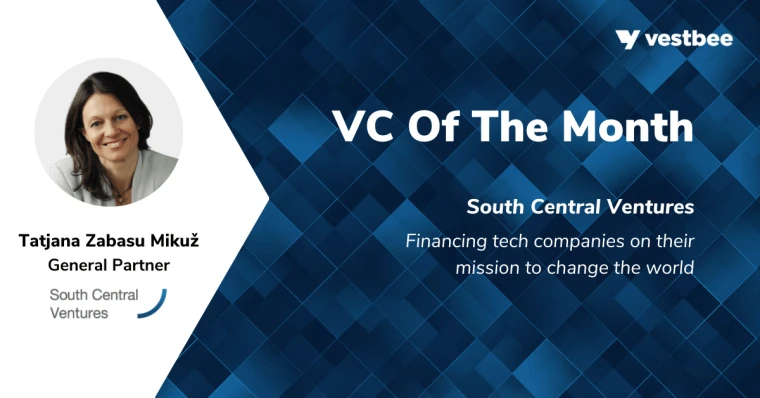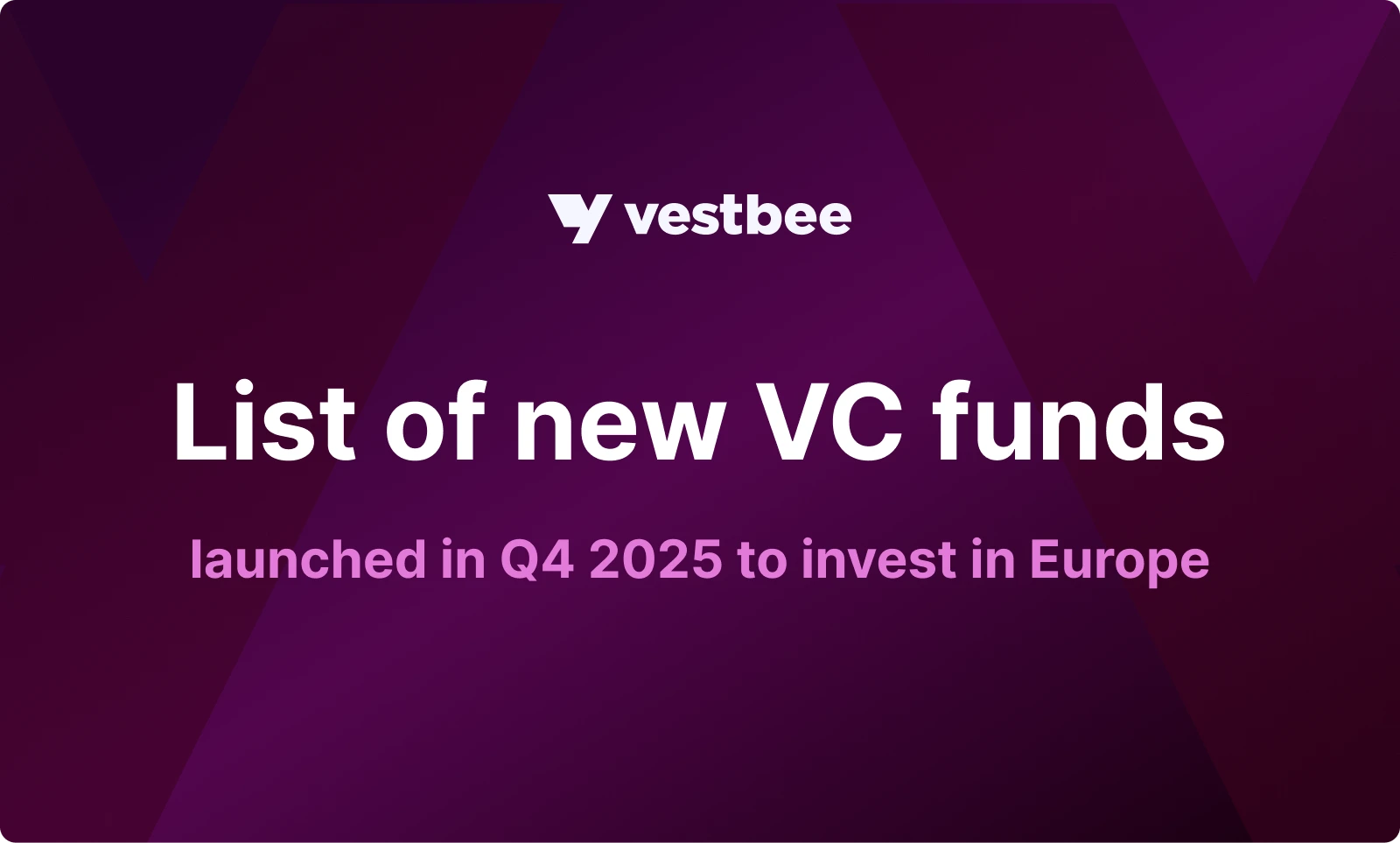South Central Ventures is an early-stage VC fund, that has been operating in the Balkans and the SEE region since 2008. SCV started off as a national fund under a different name Nowadays it operates out of offices located in Ljubljana, Zagreb, Belgrade and Skopje, and has invested in more than 40 tech teams from across the region. Investing from its SCV Technology Fund III, the team focuses on early-stage B2B companies with clear potential to scale and become global players in their respective markets.
Fund Strategy Overview
Geography: Western Balkans/SE Europe, Slovenia, Croatia
Preferred industries: Sector agnostic; B2B / SaaS
Investment ticket: € 300k to ~ €5m
Company stage: Seed / Series A
Product type: preferably Software
Product stage: MVP +
Revenues: preferably generating revenue
Q&A with Tatjana Zabasu Mikuž, Managing Partner at South Central Ventures
What are the 5 main things you look for in a startup?
The first and utmost important thing is definitely the team – how “complete” it is, what the domain knowledge of the founders is, whether they have any common track record or previous experience – you get the idea. Then there are the market size and trends, scalability of the product, and differentiating elements that make the company stand out from the competition. But essentially, it mainly comes down to the company’s DNA and its founders, how well they can define their vision and how capable they are to execute that vision. While a lot of these are “soft” elements that cannot easily be quantified, we still look for hard data supporting the growth hypothesis when making an investment decision.
What disqualifies a startup as your potential investment target?
A weak team. Even if the market potential is there, and the product the team has built is solid, if the team does not have the ambition, drive, and ability to execute, it is all a waste of time (and capital). We would also pass on an opportunity on a market that is too small or in decline, as well as a business that is not really scalable or is too capital intensive. We would generally not pursue an opportunity that is not within our investment focus, be it geographically, in terms of the development stage or the type of business.
What in your opinion differentiates the best founders from the rest?
Ambition, determination, persistence, and the ability to surround themselves with the right people. The best founders follow their vision, but constantly look for feedback and adapt. They know their market and understand when they need to change the approach – be it to customers, investors or (prospective) partners/employees. They are focused on the results and are not looking for excuses – they look for ways to cope with the challenges they face. It is not hard to recognize a good founder when you meet one.
What startups should take into account before making a deal with a VC fund?
Like any other industry, VC has its own specifics. As we often say, a deal with a VC fund is like a marriage, so one should make sure the interests of the fund are aligned with those of the startup and its founders and that they all share the same vision. VC funds typically have limited lifetime and very clear targets in terms of the returns and holding period for an investment, which requires specific actions from the fund’s team. This in turn impacts the relationship and the demands the funds have from the founders. Having said that, while founders are expected to be in charge and have control over the decisions in the company, they can still count on the fund’s support and assistance - provided of course that everyone’s goals are aligned, and everyone shares the same vision.
What is your approach to startup valuation and preferable share in the company?
The valuations depend on the stage and industry. In seed and very early-stage companies, the traditional valuation methods are more or less useless, so we usually take into account a company’s needs, i.e. investment they need to get to the next stage, the risk we are taking and the growth potential. We are looking to obtain a minority stake in the company, which depends on the stage – up to 10% in the seed stage and around 20% in later rounds.
How do you support your portfolio companies?
We aim to provide support tailored to the needs of each company. This often includes assistance with defining the strategy and next steps, we often serve as a sounding board for the founders, challenging (not criticizing) their ideas and plans. In most cases, we are also helping with HR-related matters – profiling what talent is needed and looking for the people who can bring the necessary skills. Connecting our companies with potential clients, experts or investors is another important part of the support we offer. In the past years, we have also managed to build a community of startups and founders we invested in, giving the founders a circle of people from whom to seek advice, assistance or synergies.
What are the best-performing companies in your portfolio?
Cognism, which is a sales intelligence provider to over 1800 teams and raised $87million at the end of 2021 is the top performer. The others I need to mention include AdScanner, a provider of data analytics solutions for data-driven advertising, Alchemy Cloud, which accelerates product development with the software powering digital labs, and Insightful, providing workforce analytics and productivity monitoring, all of which were consistently growing and outperforming.
What are your notable lessons learned from investments that didn’t work out as expected?
We typically invest very early, so the risk of failure is inevitably high. As mentioned before, people are the most critical success factor for any business, and making sure the interests and commitment of the founders are aligned on their end as well as with us as investors is critical.
To mention one thing we have learned is that it is not likely for a company to “shift gears”. You may find a company that seems to be somewhat de-risked as it shows decent traction, maybe is close to breaking even, but the growth momentum has been lost, or the ambition to “make it big” is less obvious. In our experience capital injections do not change the DNA of such companies and do not accelerate growth sufficiently, so you can never really generate the returns you expected.
What are the hottest markets you currently look at as VC and where do you see the biggest hype?
We actually avoid the most hyped markets, as the chances are you invest at the point where valuations are at their peak and your upside is questionable. We look for companies that are helping transform traditional businesses, and disrupt or optimize the way things are being done by introducing new technologies. This happens across industries and sectors, so we keep our eyes open for opportunities wherever they may emerge.
In your view, what are the key trends that will shape the European VC scene in the coming years?
The European VC scene has developed significantly in the past few years, with a number of new funds, larger rounds, and bigger exits. It became more dynamic, there is more liquidity in the market, and also more competition among VCs. It would be fair to say that a decade or more of continued economic growth resulted in an overheated market and some excessive valuations, and the correction we are experiencing now was expected. While this should make it more challenging for companies to get an investment, on the other hand, good companies will always be able to raise. Apart from that, we have seen more of the US-based funds increasing their interest and presence in Europe, which opens up more opportunities for companies. At the same time it means on one hand more competition for European VCs, but on the other hand, also opens up more co-investment opportunities. Another observation is that in particular in our region there are a number of new country-specific funds, which in my opinion are facing too many restrictions to be viable in the long term, and I believe the trend is more toward regional and pan-European funds dominating the market. Last and not least, as one of the still few female investors, I think we will see a trend of more mixed VC teams emerging, and more women in partner positions.
Related Posts:
VC Of The Month - Finch Capital (by Konrad Koncerewicz, Head of VC & Startups, Vestbee)
VC Of The Month - Superangel (by Konrad Koncerewicz, Head of VC & Startups, Vestbee)
VC Of The Month - Lighthouse Ventures (by Konrad Koncerewicz, Head of VC & Startups, Vestbee)







